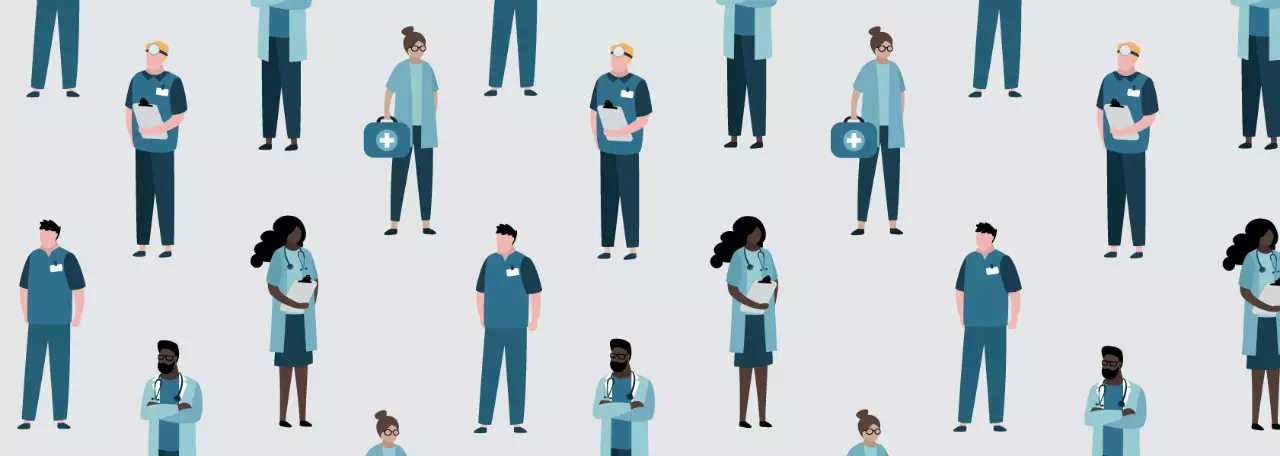How to become a registered nurse (RN)
At a glance
- To become a registered nurse (RN), you must have the required education, pass theМэNational Council Licensure ExamМэ(NCLEX-RNВ®)Мэand meet all licensing requirements for the state in which you wish to work. Many nurses Мэhave an associate or bachelorвҖҷs degree in nursing.
- °ДГЕМмМмІКҝӘҪұјЗВј offers a programmatically accredited nursing program that includes anМэRN to Bachelor of Science in Nursing (BSN)МэвҖ” as well as aМэcompetency-based versionМэвҖ”Мэthat help registered nurses enhance their careers and potentially progress into a graduate degree in the future.
There are plenty of reasons why one would choose to go into nursing. On an emotional level, a nursing career can be very fulfilling. A career spent helping people when theyвҖҷre at their most vulnerable provides a sense of both purpose and gratification. Not surprisingly, a 2019 survey of nearly 20,000 registered nurses found that a very high number (81%) wereМэ.
On a practical level, job openings are typically plentiful within the nursing field. Now more than ever the demand for qualified registered nursesМэМэвҖ” meaning that those who complete the proper training (including education and necessary licenses) will enjoy considerable opportunity when they graduate. In addition, RNs have the potential to enhance their career with a variety of roles after earning advanced degrees, like aМэMaster of Science in NursingМэ(ІСі§ұ·).
There are steps that aspiring registered nurses must take for entry into the field, but if your goal is to open additional nursing career opportunities, you may wish to consider pursuing a bachelorвҖҷs degree in nursing. HereвҖҷs a closer look at how you can accomplish this goal and choose the right nursing program.
Мэ
Becoming a registered nurse
Generally speaking, becoming a registered nurse involves attending a nursing school, obtaining the required education and passing a national standardized exam, primarily theМэNational Council Licensure ExamМэ(NCLEX-RNВ®). In addition, you must meet all licensing requirements for the state in which you choose to work.
These steps are necessary for everyone who wants to become a registered nurse. However, obtaining an RN licensure may only be the start of your career. Nursing brings opportunities for specialization, increased responsibility and continued education.
Complete nursing education requirements
The first step in any medical career is toМэchoose the appropriate education. Individuals who want to become an RN need to select a nursing school. Those that are considering becoming a registered nurse have several options to choose the educational path that fits their time frame and career goals.
The minimum education required for an RN is a diploma in nursing. However, it is common for nurses to have an associate or bachelorвҖҷs degree in nursing. Typically, a diploma in nursing or an associate degree to achieve an RN license takes at least two years to complete. Upon graduation, Мэthe next step in becoming a registered nurse is typically taking and passing the NCLEX-RN examination. Мэ
Although aМэBachelor of Science in Nursing (BSN)Мэtypically takes four years to complete, it is often preferred by employers in the healthcare industry, and it is helpful for career enhancement.
Some bachelorвҖҷs nursing programs provide an opportunity for RNs who already have an associate degree in nursing and wish to enhance their professional education byМэpursuing a BSN to transfer credits and save time and money on their degree.
Regardless of your degree choice, you should ensure that your chosen nursing school and program are accredited. The U.S. Department of Education approves two independent organizations to oversee accreditation вҖ” theМэМэ(ACENВ®) and theМэМэ(CCNE) (655 K St., NW, Suite 750, Washington, D.C. 20001, 202-887-6791). You should only choose a program accredited by one or both of these bodies.
Мэ
Pass the national nursing exam
After successfully graduating Мэfrom Мэnursing school, you are qualified to take the NCLEX-RN. The exam is computerized, and aМэМэlogits,вҖқ which you achieve by answering a specific number of questions correctly. This is an adaptive test in which questions are weighted according to their level of difficulty. You need to answer between 75 and 145 questions, depending on your performance. The test automatically stops when you achieve a passing or failing score.
Unfortunately, if you fail, youМэ. Because of this and the testвҖҷs difficulty, it is essential to properly prepare for the NCLEX. You need toМэmake time to study at homeМэandМэuse effective test prep methodsМэto give yourself the best chance for success.
It might also help toМэdesign a multi-week course of study, take practice exams and review the material with your peers. With a well-planned approach, you will feel confident when you head into the testing center.
Obtain local certifications and licenses
According to the National Council of State Boards of Nursing (NCSBN), there areМэМэin the state you plan to work in:
- Provide proof of your education from an accredited nursing program
- Show documentation of a passing score on the NCLEX-RN
- Pass a background check (in most states)Мэ
In most states, you can start the process by filling out an application online.
Depending on your area of specialization and employer, you may need to obtain additional certifications. Some employers may require specific certifications, but these can also help nurses become better educated in patient care and demonstrate an expertise in their field. Some examples of certifications include:
- Critical Care Registered NurseМэ
- Certified Emergency Nurse
- Certified Pediatric Nurse
- Certified Ambulatory Care NurseМэ(proves that you can provide specialized healthcare in a variety of clinical and community settings)
Consider a nursing specialty
Once you obtain licensure as a registered nurse, you can then progress into a nursing specialty based on your interests, career plans and opportunities.
Here are examples of nursing specialties you can consider:
- A pediatric nurseМэspecializes in providing care to patients 18 and under.
- A dermatology nurseМэworks with patients who have skin conditions or undergo cosmetic procedures.
- A case management nurseМэworks with patients who require ongoing care because of an illness or a condition.
- A neonatal nurseМэworks with infants in the first few weeks after birth.
- An oncology nurseМэcares for cancer patients.
- An orthopedic nurseМэworks with patients with bone and joint injuries and conditions.
- A hospice nurseМэprovides care for patients with terminal illnesses.Мэ
Career enhancement opportunities for RNs
Because of the high demand for qualified specialists, it is relatively easy for RNs to continue their education. Many registered nurses return to school to earn a higher degree, such as a bachelors degree after working professionally.
You can alsoМэundertake a nursing bridge programМэto move from another healthcare area directly into a nursing degree program.
Even if you already have anМэAssociate Degree in Nursing (ADN) or BSN, enhancing your career and gaining a nursing specialty often requiresМэobtaining an MSN with a concentration in administration. An MSN can provide specific skills for a chosen area. For example, if you want to work in administration, you may wish to consider obtaining a Master of Nursing degree with a concentration in Administration program.Мэ
Мэ
Nursing compared to entry-level health careers
In comparison to other healthcare positions, registered nurses are qualified to provide direct patient care in a variety of settings. Entry-level workers in healthcare, on the other hand, typically focus on one service, provide non-medical care or support nursing staff.
Here are some examples of entry-level positions:
- A nurse's aideМэperforms basic, non-medical tasks in support of the nursing staff.
- A home health aideМэassists patients with daily non-medical tasks such as bathing, dressing, cleaning and meal prep.
- A lab technicianМэcollects and organizes specimens in a lab.
- A patient service representativeМэcommunicates with patients and helps them plan or schedule treatments or appointments.
If you like the idea of helping others or having a career that directly affects peopleвҖҷs lives, becoming a registered nurse could be a good career choice. For those who may beМэuncertain about their career path, note that the demand for registered nurses continues to increase.
After you become an RN and want to enhance your career, °ДГЕМмМмІКҝӘҪұјЗВј (UOPX) can help. We offer anМэRN to BSN programМэthat helps registered nurses enhance their patient care skills and knowledge and be equipped to apply for growth opportunities like charge nurse and director of nursing. The RN to BSN program requires 120 total credits and 14 months to complete.
UOPX also offers a competency-based version of theМэRN to BSN degree. TheМэcompetency-based (CB) RN to BSNМэis designed for licensed RNs with an Associate Degree in Nursing and at least a year of experience. The CB program is self-governed with credits tied to competencies performed on the job, and since RNs often possess these skills already, they could quickly demonstrate what they know and earn skills for learning something new. It can be completed in less than one year and for under $10,000 when transferring credits from an Associate Degree in Nursing to the RN to BSN CB program. Мэ
If youвҖҷre interested in learning more about nursing degree offerings at °ДГЕМмМмІКҝӘҪұјЗВј, visitМэphoenix.edu/online-nursing-degrees.html.

ABOUT THE AUTHOR
Michael Feder is a content marketing specialist at °ДГЕМмМмІКҝӘҪұјЗВј, where he researches and writes on a variety of topics, ranging from healthcare to IT. He is a graduate of the Johns Hopkins University Writing Seminars program and a New Jersey native!
Мэ
want to read more like this?






